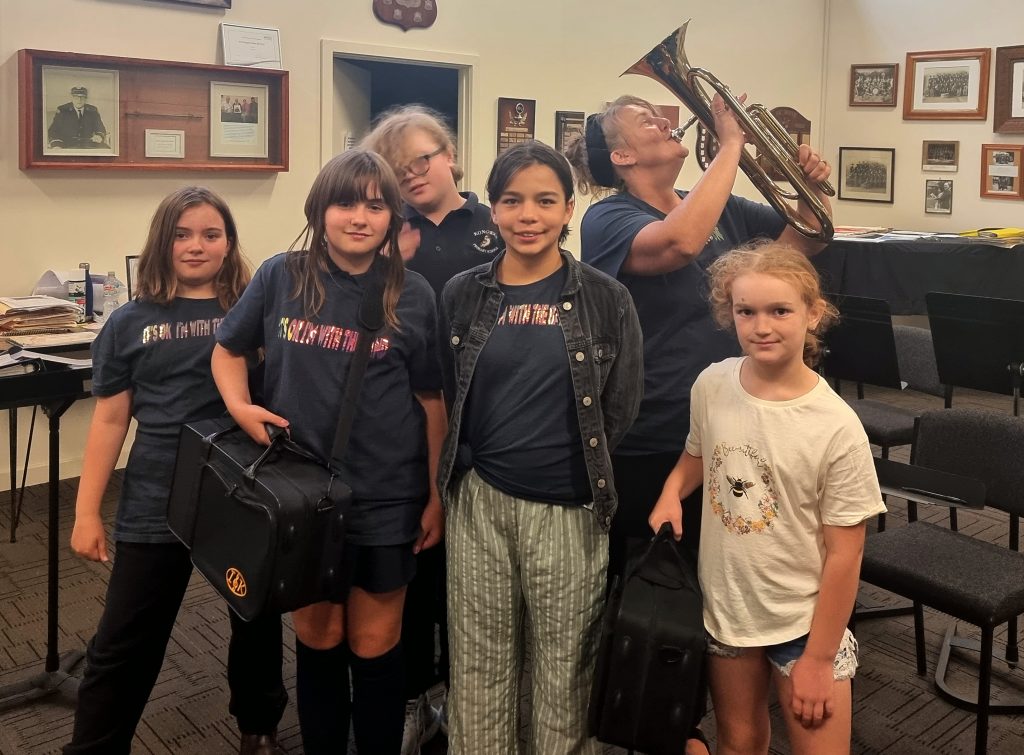Foundation for Rural & Regional Renewal (FRRR)
On Boonwurrung Country
The primarily agriculture-based Bass Coast community is a two-hour drive, south-east of Melbourne. It’s therefore perhaps not surprising that it’s one of the fastest growing areas in regional Victoria. Wonthaggi is the main centre, with a population of around 8,000 in the township and many more spread across neighbouring towns and hamlets. There is a significantly lower level of weekly income than the Victorian median and a lower proportion of school leavers (19%) participate in higher education compared to the state average (36%). Much of the employment is seasonal, part time or casual. This meant that COVID had a severe impact on the area, with many families falling through the gaps of the Government financial assistance packages.

Established in 1910, Wonthaggi Citizens Band (WCB) is managed by a voluntary committee. Its vision is to develop and nurture musicians, enabling them to provide music for the benefit of the Bass Coast community.
With COVID having an impact in an already challenging socio-economic environment, the group wanted to give an affordable music education to young people. Their aim was to introduce them to the wonder and benefits of music and encourage their participation in the band by offering subsidised tuition on brass band instruments from a qualified music teacher. It also sought to strengthen connections by bringing participants together for rehearsals in a supportive environment.
There is much documentation on the educational, cognitive and physical benefits to be received from learning music on a brass instrument, particularly in improving numeracy and literacy skills. Research shows that children who take music lessons show different brain development and improved memory over the course of a year, compared to children who do not. Further, with the high focus on childhood obesity, participation in a marching brass band cannot be underestimated for improved physical health. It improves general fitness, flexibility and muscle strength through both breathing techniques and the physical activity of marching – giving an alternate physical activity to young people not interested in sport.
This project also responded to the Bass Coast Shire Youth Action Plan, which identified the lack of options for those not interested in sport and the lack of access to appropriate arts and culture.
The organisation successfully applied to FRRR, through the Gardiner Dairy Foundation Community Grants program for $5,000 to help them establish the program and cover the initial tuition fees subsidy.
As a result, 10 young people aged between 10 and 13 had their first introduction to brass band music. These participants received half-hour individual lessons in a variety of brass instruments and then came together to learn how to play together as a band. At the end of this period, eight young people remained engaged with Wonthaggi Citizens Band and have joined the Youth Band to further their music. These young people have formed a strong social connection with one another, which assisted them during the lockdown periods when they kept in touch online. Feedback from both young people and their parents have acknowledged the benefit young people received from their participation when many others were struggling in coping through the impacts of COVID.
This project has also created social connections between generations, as the three bands of Wonthaggi Citizens Band intermingle and participate in joint performances. The music learnings by the young people have been “outstanding”, as has their participation levels. This was in no small way due to the quality of the tutor and her ability to engage with the young people, and with the senior band members who volunteered their time to assist and mentor.
“We’re excited that this project is set to have a lasting legacy, with the band set to undertake a two-year project to work with 20 ‘at risk’ students at a local primary school, using brass band music to re-engage them,” said Sandra Mousey, a volunteer on the project.
“The community is more engaged and participative, students are more engaged in learning and there are generally stronger levels of resilience in the community,” she wrote.
For more inspiring stories like this, head to our FY 2021/22 Annual Review.

